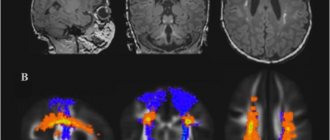Useful link: “We get 15% cashback on ALL purchases! Meditation actually calms the nervous system - this is a proven scientific fact. But how exactly does it work—and how do you get started? Now we'll tell you everything.
We live in stress. Of course, today the threats are not the same as before - but try to explain that to our body! It reacts to it in the same way as it did to mortal danger millions of years ago:
- When we perceive a threat, the adrenal glands produce “stress hormones”: adrenaline, norepinephrine and cortisol;
- Blood pressure and pulse increase;
- The muscles tense.
Now we are ready to respond to danger faster and better. “This way there are more chances to survive!” our body shouts joyfully.
But... In life, you have to pay for everything, and “mobilization services” are no exception.
If stress is present frequently in our lives, the body begins to destroy itself:
- High cortisol levels cause serious damage to nerve cells in the hippocampus, the part of the brain responsible for learning, memory and feelings;
- Are you experiencing too much adrenaline? Then get ready for problems with your heart and blood sugar levels;
- Constant stress leads to increased excitability, nightmares, sleep disturbances, problems with the gastrointestinal tract and high blood pressure (hypertension);
- The immune system also suffers;
- Finally, stress also hits you in unexpected ways - for example, it can cause... even back pain!
How does meditation affect the nervous system?
Mental exercises like meditation affect the body in a variety of ways. First of all, through the autonomic nervous system (ANS) .
The ANS is responsible for the “dirty” but vital work - breathing, heartbeat, blood pressure, etc. Meditation and pranayama activate the parasympathetic part of the “vegetative system” - our “calming nerve”. Parasympathetic relaxes muscles, calms breathing and heartbeat. As a result, we calm down and come to our senses.
If your body is afraid, meditate. Here's what happens next:
- the “stress hormone” - adrenaline - is reduced ;
- The level of cortisol decreases - with some meditations, according to German scientists from the Max Planck Institute, up to 50% ;
- In “advanced” meditators—45 minutes each for 8 weeks— the level of “gray matter” in the hippocampus increases significantly;
- After 4 weeks of training, there was a noticeable increase in nerve conduction and strengthening of nerve fibers in the anterior cingulate cortex (ACC). The ACC is responsible for the control of perceptions and emotions, as well as the ability to resolve conflicts .
- Regular meditation can lower your heart rate for a long time . Usually only athletes from disciplines that require remarkable endurance “can do” this.
Negative effects of stress
Most mental and nervous problems are directly related to stress. This word refers to a violation of the physical and nervous state, which appears in increased blood pressure, muscle tension and increased heart rate.
With constant stress, a person is often bothered by headaches, digestive problems and sexual dysfunction.
Moreover, stress invariably leads to rapid aging of the body, due to the constant production of stress hormones produced by the sympathetic nervous system. It clouds the functioning of the brain, making it impossible to devote all of one’s potential to accomplish specific goals and tasks.
If your thoughts are in chaos, it is difficult to concentrate on school or work. It is impossible to fully create with a mind overflowing with worries. In addition to all of the above, stress has the ability to make a person emotionally unstable.
One moment you can feel completely normal, and the next you can feel angry and cry due to a completely random event.
That's why it's so important to learn to take stress under firm control and learn to focus on a specific task. And meditation to calm the nervous system, which can literally change the brain on a physical level, will help with this.
Having mastered the technique of meditation, you will be able to learn to look at different things from the perspective of the perfect with a new look, just by stepping back a step.
And also...
Meditation has a beneficial effect on the ability to concentrate:
MRI images show that during meditation the so-called. prefrontal cortex. It controls our ability to focus on one thing.
That is, the more active this zone is, the better we are able to concentrate.
But the part of the brain that is responsible for our eternal “carousel of thoughts” , on the contrary, reduces activity to a minimum . Those who practice meditation regularly rarely allow themselves to be carried away by thoughts.
...and even relieves physical pain
Neuroscientists have long noticed that if a person regularly practices meditation, his brain changes . How exactly? One of the manifestations is a reaction to pain. He notices the very fact of pain more strongly. And he suffers less from them!
Look at the photo. On the left - a man is just lying there, and something hurts. On the right is the same, but during meditation:
Basic Tips
The method of the process involves achieving calm through the prism of subjective perception. However, meditation for deep relaxation and stress relief has a number of conditions and recommendations that a beginner should focus on.
- It is undesirable to practice in a lying position - then it will be difficult to concentrate in other positions.
- It is better to give preference (especially in the first lessons) to a sitting position. This does not have to be the Lotus position. The main thing is that you feel comfortable and can relax to the maximum. Your back should be kept straight, your chin parallel to the floor, your hands on your knees. The eyes should be closed or facing one point. For example, you can fix your gaze on the flame of a candle.
- A person who is still unaccustomed to the techniques of Eastern teachings will, after a few minutes, begin to experience a feeling of deep discomfort: his leg goes numb, his neck is stiff, and his patience is running out. For beginners, there is the following advice: mentally “talk” to the aching parts of the body, starting with the lower ones. Rise up gradually. When muscle tension leaves you and is replaced by relaxation, pay special attention to your brain.
- Clearing your head of information is the hardest part of stress-relieving meditation. Chiropractors advise mentally saying the following phrase: “My last thought is that I don’t have a single thought.” It is important not only to say it, but also to understand the meaning. Finding a feeling of calm, complete freedom from things occupying the head is the main task of a meditation practitioner. Depending on the strength of a person’s energy, his character and experience in such things, it may take a different amount of time to achieve complete relaxation and isolation from the outside world.
- It is best to start a planned meditation session for stress after light physical activity. This could be warm-up, exercise, dancing, a regular walk or going to the store - the main thing is that you should be in good shape. But meditating in a sleepy or hungry state, as well as immediately after eating, is not recommended at all.
- The usual session duration is 10-15 minutes. However, how long it will take an individual to achieve spiritual and physical integrity and emotional relaxation is up to him to decide.
To make it easier to overcome stress, turn on pleasant and unobtrusive music at a low volume while studying at home. Let it play while you meditate to relieve stress.
The optimal number of classes per day is two, morning and evening. Of course, this is just a recommendation, because each person has his own biorhythm and routine. Don’t forget about unscheduled practices during the working day.
How to meditate correctly?
It is not necessary to go to Southeast Asia in search of “grandfather like in the photo above.” In order to gain basic and working meditation skills, a good online course or application is enough.
If you know English well and are willing to pay for knowledge, install Headspace on your smartphone. Its author is clinical meditation specialist Andy Puddicombe. Unfortunately, trial materials run out quite quickly, and access to new information is offered only by subscription. Well, again, you need an above-average level of English knowledge.
A good alternative is the free video course “Mind Detox 2.0” from a certified teacher of meditation, yoga and pranayama, MGIMO graduate Igor Budnikov . The author teaches both purely practical things - how to sit, breathe, etc., and the “correct” mental attitudes - how to relate to thoughts, how to work correctly with emotions. The course has been in existence since 2014, and more than 100,000 people have already completed it.
By the way, Igor Budnikov himself is the best proof that meditation really has a beneficial effect on the nerves









